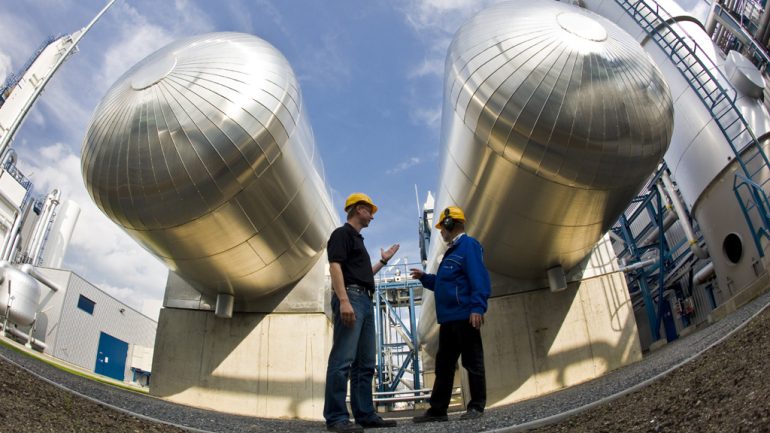Thus: 4/4/2022 4:55 PM
Which measures are really effective against climate change? The report, published today by the Intergovernmental Panel on Climate Change, describes in addition to ideal ways, where making sacrifices is not possible – and what is not worthwhile.
Human-made climate change will cause temperatures to reach 1.4 – 4.4 °C in this century – that’s it in the first sub-report On physical principles presented by the Intergovernmental Panel on Climate Change last summer. Enough range. The main reason it’s so big is that science doesn’t know how humanity will behave in the future – what they and their governments are doing to avert the climate crisis. The current third partial report actually attempts to describe this in more detail: What are our options? The report’s clear answer: the silver bullet is to stop burning fossil fuels and switch to renewable fuels. But technological solutions and nuclear power can also play a role.
The only good news is that although we are producing more and more greenhouse gases, emissions have increased more slowly in the 2010s than in the previous decade. But it will not be enough to stave off the climate crisis, scientists say, and make it clear that by the year 2100 humanity will be heading towards a warming of 3.2 degrees Celsius compared to pre-industrial times.
Industrialized countries have to change something
For UN Secretary-General Antonio Guterres, this means: “We are rapidly moving towards climate disaster.” If the world really wants to adhere to the 1.5-degree limit, CO2 emissions are likely to increase by 2025 and then reduce by 43 percent by 2030. A third of methane emissions will also have to be avoided. However, even after this there will be a temporary overshoot of 1.5 degree Celsius.
If we were to accept a two degree Celsius increase in temperature, a 25 percent drop would still be necessary – and that’s on average around the world. For industrialized countries, this has always meant higher prices. The 50 least developed countries have so far contributed only 0.4 percent of the total man-made greenhouse effect. The report also clarifies this.
“Royal Roads”: Sun, Wind, Strong Forest
The next eight years will be crucial for further development. That is the main message. Because the targets that states have so far promised – as far as they have been reported to the UN Climate Secretariat as national climate protection commitments – are not enough to limit temperature rise: they are still 2.8 per cent. lead to a warming of degrees Celsius. The existing infrastructure of power plants and industrial plants alone would be more than enough to consume the remaining carbon budget.
The report clarifies the potential of individual measures. The Intergovernmental Panel on Climate Change does not determine which of these governments is elected. He calculates dozens of scenarios and explains the dimensions – for example, in a diagram. The longest sticks show the biggest benefits: Solar power, wind power and less forest destruction – these are silver bullets in the fight against the climate crisis. Each of these options has the potential to avoid up to ten percent of annual greenhouse gas emissions. Another advantage: the expansion is already worthwhile from an economic point of view or can be done for a small additional cost. Solar, wind and battery costs have dropped by up to 85 percent since 2010.
capture CO2 from the air
But the list of smaller bars along with these larger areas is long. This means: many different measures are possible and necessary, even if they do not bring much or cost a lot personally. This applies, for example, to all methods of technically separating CO2 from plant exhaust gases or filtering it directly from the air and “removing it” in underground storage facilities. Without these pathways briefly discussed under CDR or CCS, the authors state that this would not work – especially not when a temperature increase of more than 1.5 °C has to be “recovered” later.
The Intergovernmental Panel on Climate Change considers it necessary to do more here. Furthermore, because in all future energy flow scenarios there will always be an unavoidable residue of emissions that would have to be neutralized in this way. However, the lead author of the relevant chapter, Dr. Oliver Gaiden: Emissions reduction is a must. Relying solely on such methods is not an option.
Felix Creutzig, Working Group on Land Use, Infrastructure and Transport MCC Berlin, on options to limit climate change
tagschaus24 5:00 pm, 4.4.2022 5:27 pm
It is worth using nuclear power, not expanding it
CO2 storage through other agricultural methods and afforestation has great potential, but the costs are often high. A healthy – especially low-meat – diet is also important, basically free of charge and obtaining even more from the use of nuclear energy. Because nuclear power plants are only cheap if they already exist. On the other hand, new ones are extremely expensive: methane from leaks in natural gas pipelines and gases from coal mines and oil extraction systems contribute six percent of the climate crisis. 50 to 80 percent of such emissions can be avoided with little effort.
“There are bright spots,” says coordinator Jan Christoph Minks, lead author of the first chapter of this report. The cost of climate protection has dropped sharply. At a cost of less than $100 per ton of carbon dioxide, half of emissions can be avoided.
Commenting on the report, Friday for Future Germany said: “The political wait for a technological miracle will be in vain. There is no substitute for CO2 removal that replaces the need for radical emissions reductions.”
“More and more greenhouse gases – which undermine the fundamental human and environmental rights of the world’s most vulnerable,” said Vanuatu’s foreign minister, Mark Atti. EU Commission Vice-President Frans Timmermann called on all states to improve their climate targets to a limit of 1.5 degrees this year at the UN climate conference in Sharm el-Sheikh, Egypt.

Introvert. Proud beer specialist. Coffee geek. Typical thinker. Pop culture trailblazer. Music practitioner. Explorer.





